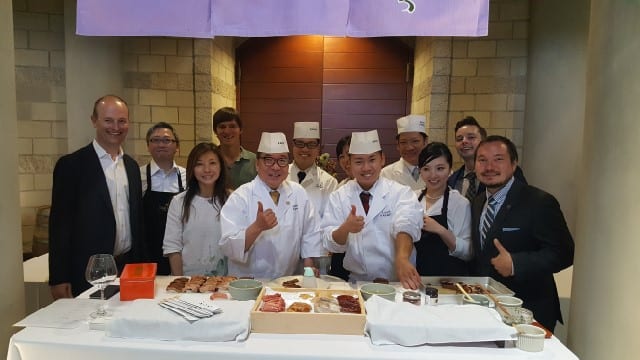
25 May Sushi and Cabernet
This story originally appeared in the Napa Valley Register.
What do you think about drinking when you eat sushi? Beer, sake or a crisp white wine such as riesling, gruner veltliner or sauvignon blanc? What if I said cabernet sauvignon? Yes, a red wine with sushi. After a recent dining experience, I have been convinced that it can work. But, it takes a unique kind of sushi and the right wines.
The sushi is called Edomae, which means the “style” or “the way” of Edo, the former name of Tokyo). It is a type of sushi that was popular in Tokyo in the 1800s.
During this time, there was no refrigeration system to preserve the fish, so chefs marinated and seasoned the fish to preserve it safely. The fish, shellfish and conger eel would be caught and lightly processed with vinegar, salt and soy sauce and then laid on vinegar rice. During this preservation of the fish, the water is extracted, as well as the fishiness. The result is sushi that emphasizes umami flavors, and this is what pairs with wine.
Edomae was how fish was eaten for 350 years in Japan. But with modern refrigeration and transportation over the last 50 years, the style has changed now we eat the fish fresh.
Today, there are only a few written records abut Edomae and it is a technique handed down from chef to chef. One of these chefs is Chef Kiminari Togawa, owner and chef of Ginza Sushi Karaku, one of Tokyo’s top sushi restaurants. Chef Togawa is also a proponent of pairing wines with his omakase menus and one of the wineries he features in his restaurant in Tokyo is Dierberg Star Lane from Santa Barbara wine country.
The Dierberg family purchased property in Happy Canyon AVA in Santa Barbara wine country in 1996. Originally from Missouri, where they own the second-largest winery, they were looking around the world for the perfect place to plant vineyards.
Formerly a dude ranch, Star Lane is an anchor point of Happy Canyon, consisting of 40 percent of the total acreage of the AVA. The vineyard, which sits on an elevated ridge, is divided into more than 80 blocks, each with multiple sub-sections that vary in soil structure. Star Lane Vineyard is where winemaker Tyler Thomas produces sauvignon blanc, merlot and cabernet sauvignon, and the chardonnay and pinot noir come from their Dierberg Vineyard in Sta. Rita Hills AVA.

I was recently invited to Star Lane for a special lunch with Chef Togawa who was visiting Santa Barbara. Chef prepared an omakase menu for us paired with the wines of Dierberg Star Lane.
The Edomae style of sushi, which has depth and texture, as well freshness and umami flavors, pairs naturally with wine. According to Chef Togawa, an advocate for sushi and wine pairings, “we drink wine with food. Wine is to complement, not change the food profiles.”
As we sat down for lunch, Chef Togawa explained that the sushi will taste one way and the wine will taste one way. But when the two are paired together, a “flavor bridge” is what is left on the palate.
The menu
— First course:
2015 Star Lane Sauvignon Blanc Happy Canyon of Santa Barbara
2005 Star Lane Sauvignon Blanc Santa Ynez Valley
Kanpachi (Yellowtail) Marinated in White Wine
Tai Seabream with Marinated Kelp and Yuzu
Seafood Dressed in Basil Sauce
The highlight of this pairing was not only the beauty and freshness of the 2005 sauvignon blanc, with notes ranging from lime, lemongrass and acacia flowers to oxidized honey and nuts and the still-present acidity, but also how when the 2005 was paired with the sea bream, the result was flavors of dried herbs and yuzu.
— Second course:
2014 Dierberg “Dierberg Vineyard” Chardonnay Santa Maria Valley
2014 Dierberg “Drum Canyon Vineyard” Chardonnay Sta. Rita Hills
Tai Seabream pickled in Sesame Soy
Broiled Skin-on Tai Seabream
King Crab Mille Feuille
The baked apple, lemon curd and vanilla notes of the Santa Maria chardonnay, paired with the pickled sea bream, created a “flavor bridge” of cream and hazelnuts. The Sta. Rita Hills chardonnay, with notes of apple, lemon and brioche paired with the oil and umami broiled skin-on sea bream created a salty and smooth “flavor bridge.”
— Third course:
2014 Dierberg “Dierberg Vineyard” Pinot Noir Santa Maria Valley
2014 Dierberg “Drum Canyon Vineyard” Pinot Noir Sta. Rita Hills
Pickled Red Maguro tuna in soy
Chu-Toro fatty tuna sprinkled with wine salt
Oil-marinated salmon with tomato water
The Santa Maria pinot noir showed notes of cherry, raspberry and clove but when paired with the pickled tuna, the tartness of the wine disappeared and the result was a plum flavor. The standout pairing was the Sta. Rita Hills pinot noir with notes of tart cherry, boysenberry, tomato vines and tea and when paired with the fatty tuna, it was harmonious and sexy.
— Fourth course:
2013 Star Lane Cabernet Sauvignon Happy Canyon of Santa Barbara
2011 Star Lane Astral Happy Canyon of Santa Barbara
Broiled Toro
Mirin Marinated Conger Eel
Teriyaki Fatty Yellow Tail with Foie Gras
The cassis, blackberry and cedar notes of the 2013 cabernet sauvignon and the savory, oily flavors of the broiled Toro created a rich spice box of tastes. The 2011 Bordeaux blend expressed depth, as well as dark red fruits and rosemary that matched the sweetness of the eel.
Edomae sushi naturally matches with wine. The flavors of both the wine and the food were present. And even with the pairing of cabernet sauvignon with sushi, nothing was forced. While Edomae is a unique experience, even for those in Japan, there are a handful of restaurants in San Francisco, Los Angeles and New York that serve Edomae sushi. Should you seek one of these out, be sure to try pairing it with pinot noir or cabernet sauvignon.
Read the original story in the Napa Valley Register.
Discover more from Please The Palate
Subscribe to get the latest posts sent to your email.







